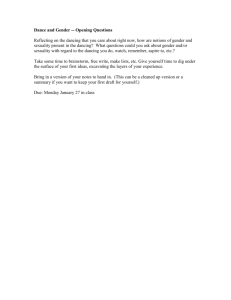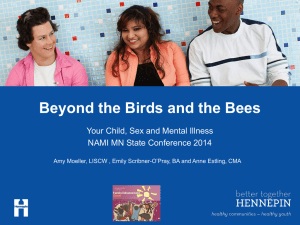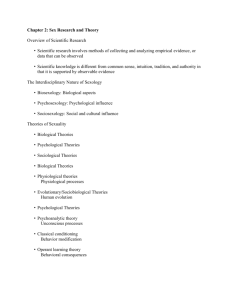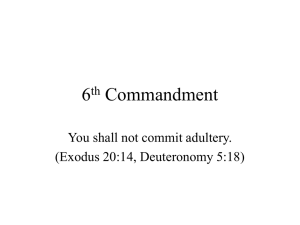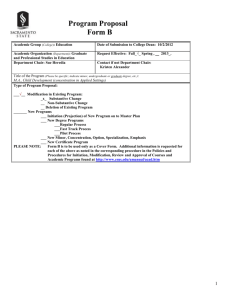Autumn 2013 Undergraduate Courses
advertisement
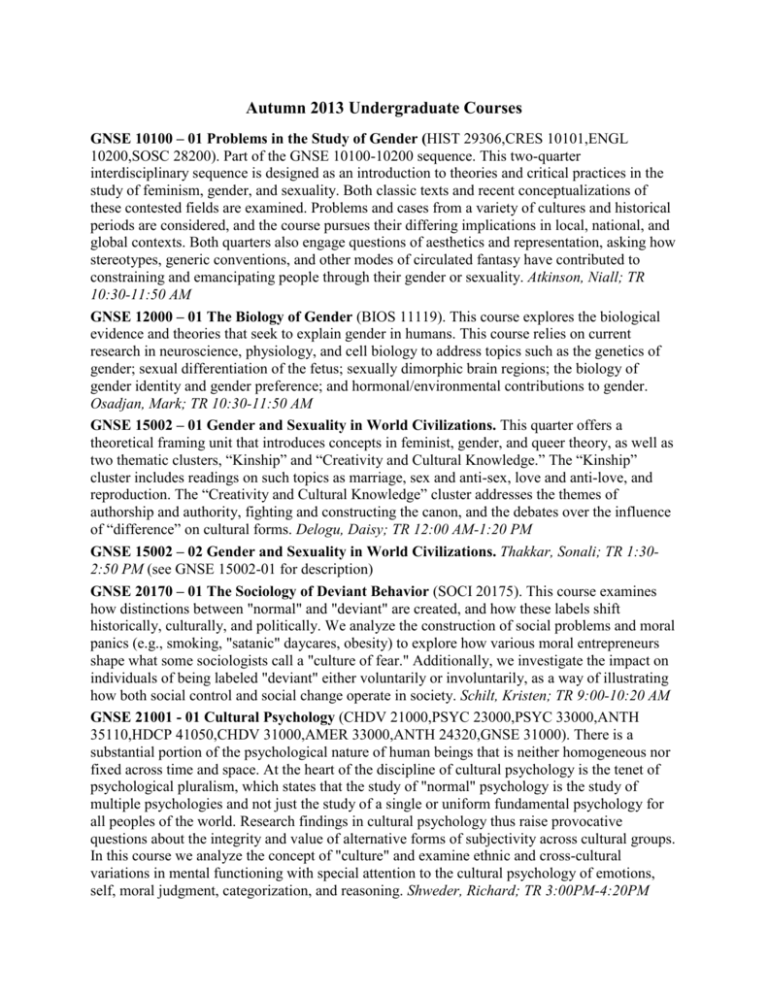
Autumn 2013 Undergraduate Courses GNSE 10100 – 01 Problems in the Study of Gender (HIST 29306,CRES 10101,ENGL 10200,SOSC 28200). Part of the GNSE 10100-10200 sequence. This two-quarter interdisciplinary sequence is designed as an introduction to theories and critical practices in the study of feminism, gender, and sexuality. Both classic texts and recent conceptualizations of these contested fields are examined. Problems and cases from a variety of cultures and historical periods are considered, and the course pursues their differing implications in local, national, and global contexts. Both quarters also engage questions of aesthetics and representation, asking how stereotypes, generic conventions, and other modes of circulated fantasy have contributed to constraining and emancipating people through their gender or sexuality. Atkinson, Niall; TR 10:30-11:50 AM GNSE 12000 – 01 The Biology of Gender (BIOS 11119). This course explores the biological evidence and theories that seek to explain gender in humans. This course relies on current research in neuroscience, physiology, and cell biology to address topics such as the genetics of gender; sexual differentiation of the fetus; sexually dimorphic brain regions; the biology of gender identity and gender preference; and hormonal/environmental contributions to gender. Osadjan, Mark; TR 10:30-11:50 AM GNSE 15002 – 01 Gender and Sexuality in World Civilizations. This quarter offers a theoretical framing unit that introduces concepts in feminist, gender, and queer theory, as well as two thematic clusters, “Kinship” and “Creativity and Cultural Knowledge.” The “Kinship” cluster includes readings on such topics as marriage, sex and anti-sex, love and anti-love, and reproduction. The “Creativity and Cultural Knowledge” cluster addresses the themes of authorship and authority, fighting and constructing the canon, and the debates over the influence of “difference” on cultural forms. Delogu, Daisy; TR 12:00 AM-1:20 PM GNSE 15002 – 02 Gender and Sexuality in World Civilizations. Thakkar, Sonali; TR 1:302:50 PM (see GNSE 15002-01 for description) GNSE 20170 – 01 The Sociology of Deviant Behavior (SOCI 20175). This course examines how distinctions between "normal" and "deviant" are created, and how these labels shift historically, culturally, and politically. We analyze the construction of social problems and moral panics (e.g., smoking, "satanic" daycares, obesity) to explore how various moral entrepreneurs shape what some sociologists call a "culture of fear." Additionally, we investigate the impact on individuals of being labeled "deviant" either voluntarily or involuntarily, as a way of illustrating how both social control and social change operate in society. Schilt, Kristen; TR 9:00-10:20 AM GNSE 21001 - 01 Cultural Psychology (CHDV 21000,PSYC 23000,PSYC 33000,ANTH 35110,HDCP 41050,CHDV 31000,AMER 33000,ANTH 24320,GNSE 31000). There is a substantial portion of the psychological nature of human beings that is neither homogeneous nor fixed across time and space. At the heart of the discipline of cultural psychology is the tenet of psychological pluralism, which states that the study of "normal" psychology is the study of multiple psychologies and not just the study of a single or uniform fundamental psychology for all peoples of the world. Research findings in cultural psychology thus raise provocative questions about the integrity and value of alternative forms of subjectivity across cultural groups. In this course we analyze the concept of "culture" and examine ethnic and cross-cultural variations in mental functioning with special attention to the cultural psychology of emotions, self, moral judgment, categorization, and reasoning. Shweder, Richard; TR 3:00PM-4:20PM GNSE 21601 – 00 Introduction to Political Philosophy (PHIL 21600, PLSC 22600). In this course we will first investigate what it is for a society to be just. Among the questions we will consider in this portion are the following: In what sense are the members of a just society equal? What freedoms does a just society protect? Must a just society be a democracy? What economic arrangements are compatible with justice? Authors to be discussed here include John Rawls, Robert Nozick, and G. A. Cohen. In the second portion of the course we will consider one pressing injustice in society in light of our previous philosophical conclusions. Possible candidates include, but are not limited to, racial inequality, economic inequality, and gender hierarchy. Here our goal will be to combine our philosophical theories with empirical evidence in order to identify, diagnose, and effectively respond to actual injustice. Laurence, Ben; TR 1:30-2:50 (plus 50 minute discussion section) GNSE 22704 – 01 Sex and Sexualities in Modern U.S. History. This course is designed to serve as the third in a series of offerings the Center for the Study of Gender and Sexuality has offered in conjunction with the research project, Closeted/Out in the Quadrangles: A LGBTQ History of the University of Chicago, which will culminate in a major exhibition in Joseph Regenstein Library during Spring Quarter 2015. Previous courses have examined oral history, narrative, and historical memory as frames for understanding the role of sexuality in American culture more broadly. This third course is designed to take a step back and offer undergraduate students a comprehensive survey of the history of sex and sexualities in 20th--‐century America, a topic that has not been offered in several years. I have taken care to outline a potential reading list with few to no overlaps in readings from the previous two courses. Mercado, Monica; TR 3:00-4:20 GNSE 23100 - 00 Foucault: History Of Sexuality (PHIL 24800,HIPS 24300,CMLT 25001,FNDL 22001). This course centers on a close reading of the first volume of Michel Foucault’s The History of Sexuality, with some attention to his writings on the history of ancient conceptualizations of sex. How should a history of sexuality take into account scientific theories, social relations of power, and different experiences of the self? We discuss the contrasting descriptions and conceptions of sexual behavior before and after the emergence of a science of sexuality. Other writers influenced by and critical of Foucault are also discussed. Davidson, Arnold; TR 10:30AM-11:50AM (plus 50 minute discussion section) GNSE 23903 -- 01 The Politics of Reproduction in 20th Century United States. It has long been argued that women’s role in reproducing the nation has been used to justify her exclusion from the public sphere in order to protect her morals, which were necessary to educate her children in moral citizenship. This tension— women make the citizens, and thus cannot be citizens, of course only describes the experience of a certain class of women during a particular historical time: white, able-bodied, and economically preferred. The actual experience of the political controversies surrounding reproduction for women in the United States shows a much more variable and convoluted picture. Which subjects were reproductively valued, yet politically reviled? How did notions of racial hygiene in the 20th century play out and why did reproduction become its central mode of expression in the United States? What did the transformations in medical technology mean for reproduction and its place in politics? The purpose of this class is to analyze the political controversies that have surrounded aspects of sexuality and reproduction in the United States from a political perspective. Through analyzing both historical and contemporary politics surrounding reproduction, this class aims to deepen understanding of how identity, particularly gender, race, disability, and class, came to be articulated as the objects of political action and how, through reproduction, these same groups came to articulate different political subjectivity. McKinney, Claire; MW 1:30-2:50 GNSE 27502 – 01 Tell Me the Truth: The Politics of Narrative Construction (ARTV 27502, SOCI 20227, TAPS 28426). The course will be a hybrid fusion of practice-based cultural production and theoretical discussion about how sociologists and non-fiction based artists construct empirical truths. Drawing on transgender identities as a case study, we will examine how new generations of scholars and artists validate, deepen, and disrupt well-established understandings when they contribute to the existing genealogy of knowledge both in the academy and through new media. Students will receive training in digital new media production and sociological interview methods. No previous production experience is required. This course is supported by a Mellon Fellowship for Arts Practice and Scholarship at the Richard and Mary L. Gray Center for Arts and Inquiry. Schilt, Kristen and Joynt, Chase; MW 3:00-4:20 PM and W 4:30-5:50 PM GNSE 27605 – 01 U.S. Legal History (HIST 27605). This course focuses on the connections between law and society in modern America. It explores how legal doctrines and constitutional rules have defined individual rights and social relations in both the public and private spheres. It also examines political struggles that have transformed American law. Topics to be addressed include the meaning of rights; the regulation of property, work, race, and sexual relations; civil disobedience; and legal theory as cultural history. Readings include legal cases, judicial rulings, short stories, and legal and historical scholarship. Stanley, Amy Dru; MW 1:30-2:50 PM GNSE 28601 – 01 Outsiders I: Elsa Morante (ITAL 24803, FNDL 25302). One of the most innovative and original writers of twentieth-century Italy, Elsa Morante (1912–1985) did not enjoy canonization and full integration into the modern Italian novel tradition during her life. From the late 1940s to her death, her works stimulated numerous critical debates, but she remained fundamentally an “outsider” whose art could not find a comfortable place in the prevailing niches into which her more “insider” contemporaries were placed. In this course we shall read and analyze in detail her novels and essays, and consider the earlier and more recent critical reception of her corpus. We shall also consider her influence on subsequent writers, and the ways in which her poetics and practice interact in important ways with feminist, queer, and political theories of current interest. West, Rebecca; TR 1:30-2:50 PM GNSE 29800 – 01 B.A. Paper Seminar. Staff; ARR/ARR



